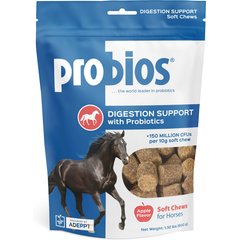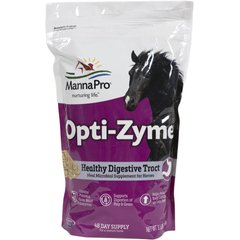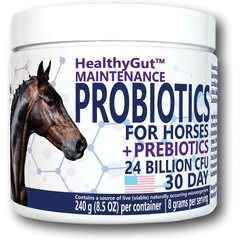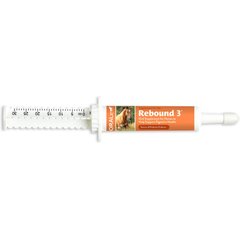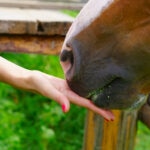How To Choose the Best Probiotics for Horses

Photo by Chewy
Horses are “hind-gut fermenters,” which means they rely on billions of microbes in their large intestine to digest fiber-based grass and hay. A healthy gut microbiome is essential for their proper digestion, health, and well-being.
Probiotics for horses are gaining popularity as a way to support digestive health, boost immunity, and prevent common health issues. But what exactly are probiotics and how do they benefit our equine companions?
Let’s take a look at the role these supplements play, the types available, and how to know if your horse may need them.
What Are Probiotics?
Probiotics are beneficial bacteria and yeast cultures that support digestive health by maintaining a balanced gut microbiome. These live microorganisms naturally exist in the horse’s intestine, and they help break down food, absorb nutrients, and keep harmful bacteria at bay.
In horses, probiotics are particularly important because their guts are highly sensitive and prone to imbalances and upset that can be caused by stress, diet changes, or antibiotics.
When a horse’s gut flora becomes unbalanced, it can lead to digestive problems such as colic, diarrhea, or poor nutrient absorption. Working with veterinarians to strategically introduce probiotics into the diet when needed can help restore balance, improve digestion, and support general health.
What Do Probiotics Do for Horses?
Horses can benefit from probiotics in multiple ways. These supplements aid in digestion, support the immune system, and can prevent or alleviate digestive issues.
Probiotics can help with:
- Preventing colic
- Resolving diarrhea and loose stool
- Improving nutrient absorption
- Supporting the immune system
- Maintaining a healthy weight
- Reducing stress-related digestive upset
Horses who might benefit from probiotics include:
- Performance horses under high stress with intense travel and competition schedules
- Horses who are prone to colic or other digestive issues
- Senior horses with declining digestive efficiency who have a hard time maintaining a healthy weight
- Horses recovering from illness and/or antibiotic treatment
What Kinds of Probiotics Can Horses Take?
Several types of probiotics are available for horses based on different types of bacteria and yeast cultures, each offering specific benefits. Some of the most common types are:
- Lactobacillus: One of the most common bacterial probiotic strains, helping to balance gut flora and improve digestion
- Saccharomyces boulardii: A beneficial yeast that supports gut health and helps prevent diarrhea
- Bifidobacterium: Bacteria that help break down food and improve digestion, particularly in foals and senior horses
- Enterococcus: Supports a healthy balance of good bacteria and prevents harmful bacteria from taking over
- Bacillus subtilis: A hardy bacterial strain that survives stomach acid and colonizes the gut effectively
How Do I Know if My Horse Needs Probiotics?
Determining if your horse needs probiotics depends on their overall health and behavior.
Signs that a horse might benefit from such a supplement include:
- Frequent diarrhea or loose stool
- Chronic colic episodes
- Signs of digestive discomfort, such as bloating or gas
- Poor appetite, with or without weight loss
- Dull coat or lack of energy
- Recent use of antibiotics, which can disrupt gut flora
If you notice any of these signs, ask your veterinarian about introducing a probiotic as part of their recommended treatment plan. The supplement could help restore balance in your horse’s digestive system.
What Is the Best Probiotic for Horses?
When selecting a probiotic for your horse, consider the following factors:
- Type of probiotic strains: Look for bacterial strains known to benefit horses, such as Lactobacillus and Saccharomyces boulardii.
- Form of administration: Probiotics come in powders, pellets, pastes, and chews. Choose one based on convenience and your horse’s individual preference.
- Quality and reviews: Opt for well-reviewed products with high ratings from reputable suppliers.
- Veterinarian recommendation: Consult with a vet who can help you choose the best probiotic for your horse’s specific needs.
Highly Rated Probiotic Products for Horses
Consider these equine probiotics if your horse is experiencing digestive upset:
- Probios Equine Probiotics Soft Chews: Easy-to-feed chewable probiotic treats for daily gut support
Recommended Product
- Manna Pro Opti-Zyme Microbial Probiotic: A powdered formula containing probiotics for maintaining digestive balance
Recommended Product
- Equa Holistics HealthyGut Maintenance Probiotics Powder: Powdered probiotics for easy feeding and improved gut health
Recommended Product
- Oralx Rebound 3 Digestive Paste: Microbial cultures formulated to help restore and maintain the good microorganisms that keep your horse’s gut functioning well
Recommended Product
How Long Can a Horse Be on Probiotics?
Your horse can stay on probiotics indefinitely unless you are told otherwise by a veterinarian or nutritionist.
Some horse owners use probiotics only during times of stress (such as travel, competition, or antibiotic use), while others find value in including them as a daily supplement for overall digestive support.
The duration of administration can vary depending on the product and individual animal, so always follow the manufacturer’s guidelines and your vet’s advice.
Can You Give a Horse Too Many Probiotics?
Yes, it is possible to overfeed probiotics, though serious side effects are rare.
Healthy horses naturally have a balanced gut microbiome, and too many probiotics can sometimes disrupt this balance rather than help it.
Signs that your horse may have too many probiotics include:
- Loose stool or diarrhea
- Increased gas or bloating
- Changes in appetite
- Mild digestive discomfort
If you notice any of these clinical signs, try reducing or stopping the probiotic for a few days and turn to your vet for advice. Always introduce probiotics gradually and follow dosage instructions to avoid overwhelming your horse’s digestive system.
Probiotics for horses can be a valuable addition to a horse’s diet, promoting digestion, immune health, and overall well-being. Whether your horse is prone to colic, recovering from a course of antibiotics, or simply needs extra digestive support, probiotics can help maintain a healthy gut.
Always choose dietary supplements made with high-quality ingredients by reputable manufacturers, monitor your horse’s response, and consult with a veterinarian or equine nutritionist if you have any concerns. When selected and administered strategically, the right probiotic can be a beneficial addition to your horse’s health and well-being.
This content was medically reviewed by Kaela Schraer, DVM.

